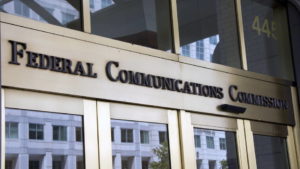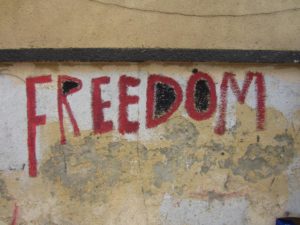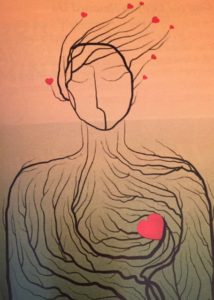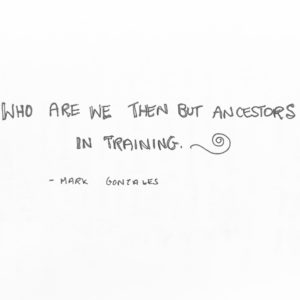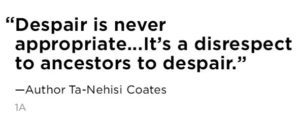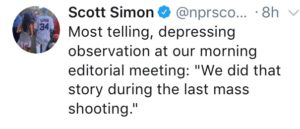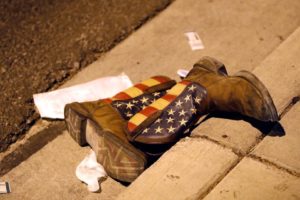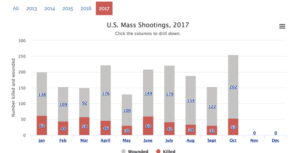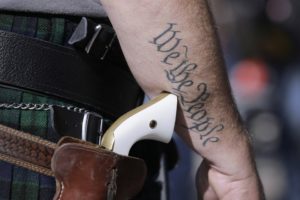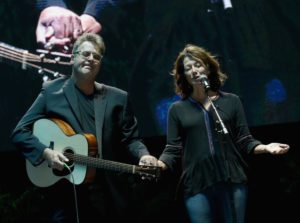We are verbs.
October 27, 2017We are truth, not “facts.” Verbs, not nouns. We evolve. We are life. We are alive. The realest truth, with galaxies in our eyes.
~Jennifer Rose
Let’s bring back:
Emotions
Creativity
Intuition
Justice
Peace
Nature
Love
Let’s re-humanize.
4th Estate dangerously weakened.
October 25, 2017FCC Eliminates Rule to Ensure Residents Have Say in Local Community Broadcast
In media news, the Federal Communications Commission has voted to eliminate a decades-old rule that ensures community residents can have say in their local broadcast station. The regulation, known as the “main studio rule,” requires broadcasters to have a physical studio near where they have a license to transmit. Opponents say the elimination of the rule will accelerate the consolidation of the media industry, allowing massive corporate media companies, such as the right-wing Sinclair Broadcast Group, to buy up and control even more local stations.
[Democracy Now]
Seth Godin
October 24, 2017The ‘Public’ in Public Media
October 23, 2017Posted by Aspen Institute on Mon., Oct. 23rd
MEDIA SHIFT
Author: Sarah Alvarez
Next month it will be 50 years since the Public Broadcasting Act, steeped in the Great Society idealism of President Lyndon Johnson’s administration, became law. The act turned programming like “Sesame Street,” “Reading Rainbow” and “Mr. Rogers Neighborhood” into true public goods. I was raised on these goods. When I began a career in journalism, it was in public radio.
Now, on the silver anniversary of the act, it’s completely plausible that the Trump administration might celebrate by making good on their threats to defund as much of the public broadcasting apparatus as they can. While it’s unlikely NPR and PBS want this to happen, they have been preparing for a future without government money for a long time. The biggest stations have figured out how to bring in money without sacrificing quality. Still, the shift away from public money in public broadcasting has caused significant collateral damage: Public media, maybe unintentionally, now strives to serve an elite audience instead of an expansive and inclusive vision of the “public.”
The hope is that more affluent audiences can be counted on to add to their closet full of pledge drive tote bags when the time comes. This is the same audience commercial news organizations look for so they can buy things advertisers sell. These target consumers have more news than they need. Perversely, that means even the most thought-provoking public media is used more for entertainment that anything else.
Serving Everyone
When the Public Broadcasting Act was introduced, it was ahead of its time in advocating for the interests of disenfranchised people — people of color and children — and speaking to the importance of diversity in mass communications.
What was missing when the law was introduced, however, was a clear understanding of what it meant for media to serve everyone. That fuzziness has gotten worse over time, even as we have become more dependent on accurate and timely information to grab hold of any part of the American Dream.
Mr. Rogers Neighborhood (Image courtesy François S. Clemmons CC BY-SA 4.0)
About one third of all Americans are low-income and plenty have acute information needs they want and need filled. Still, lower income news consumers are seen as a risky audience, even for public media. Any lack of public media support by people with less money, specifically lower income people of color, should not be fodder for a classist judgment on news consumption habits. It should be seen as a completely logical decision. Buying yourself a suit in the wrong size makes no sense and neither does buying a news product designed for somebody else.
Journalism can be more than a post-catastrophe news provider for low-income audiences. It could be a delivery system of reported, vetted, valuable information to the people who want and need it most. Anything else is a failure of imagination that constricts the idea of what public media in particular owes all news consumers.
Companies like Hearken, and journalists at KPCC, the Center for Investigative Reporting, ProPublica and City Bureau are working to figure out new ways journalists can hold ourselves accountable to news consumers. Collectively, it is our job to breathe life into journalism’s business model and ethical obligations.
It may seem unfair to push the news industry to do better at a time when journalists are under siege by industry finances and a toxically hostile political environment. But the Trump era has distracted us from journalism’s persistent blind spots with an “it was the best of times, it was the worst of times…” disorientation that will not change the course of decades of industry decline.
I worry if we continue to ignore the information needs of news consumers representing a wide swath of economic and demographic realities, we will deserve any loss of relevance we experience.
Sarah Alvarez is the founder of Outlier Media, a data journalism service delivering high value information to low income news consumers in Detroit via SMS. Kimberly Springer contributed historical research and context for this piece.
☾
October 20, 2017New Moon is Thursday, October 19
Power Path
Use this new moon as a transition time from working on and experiencing your inner stability and balance, to using it as your container of support as you step out and show up more in your life. Take courage and commitment from some of the stronger energies surrounding this New Moon and continue to focus on how best to balance your life with what you have to work with at this time.
Revisit your intentions and refine them based on recent events, experiences, insights and acceptance of changes made by others. Practice being adaptable, observant, neutral, accepting and resilient. This may bring up having to look at your attachments and consciously work on letting them go. This is a time to be in community, get support, and make a stand for yourself. Be responsible for your own life. No-one else out there is.
‘Nurture this voice.’
October 12, 2017If you have an inner voice telling you that how this country is now is not right, / that these shootings aren’t right, / That racism isn’t right, / That treating immigrants as they are isn’t right, / honor that voice. / It’s your heart reminding you that love is real, that there is a more beautiful way to live. / Nurture this voice, and link it to others. / We are not alone. / We are not bound to live in a starless night. / Love will win. InshaAllah. / It will come into public, as justice.
-Omid Safi
•
On Being Staff:
“In response to the mass shooting in Las Vegas, we offer this special commentary. President Trump called it “an act of pure evil.” Courtney questions why we use the word “evil” to explain such violence. And, she argues, why we should stop making that moral bargain. I realize this is a complex issue. How do you think through it?”
The Mental Bargain We Make When We Use the Word ‘Evil’
by Courtney E. Martin
On Being
“’Evil’ is a cop-out. It distances us from asking hard, important, and specific questions about how this could have been prevented and what each of us can do to save lives — actual human lives — in the future. … If there is evil here, it is complacency, and it is collective.”
I don’t want to make that moral bargain in my brain anymore. I’m not going to call Stephen Paddock “evil,” and I’m not going to sit idly by when anyone else does — whether that person is my president or my neighbor. Not for his sake, but for my own. I refuse to live in a moral world of my own making where mass shootings are inevitable and don’t have anything to do with me. Instead of numbing myself with that powerful little word — “evil” — I’m going to dig into moral and strategic questions like:
Why did Paddock have 23 firearms (including an AR-15-style assault rifle) and hundreds of rounds of ammunition? Why does anyone have 23 firearms and hundreds of rounds of ammunition?
Why can’t this country agree on common sense gun legislation that would prevent the mass murder of innocent people?
What was Paddock’s mental state? Who knew about it? Why didn’t he have connections with people who were more aware of the dangers of his mental state and capable of getting him help?
Is mental illness on the rise among white men and, if so, why?
What kind of funding goes into addressing the mental health of men like Paddock?
What have I, personally, done in the wake of mass shootings in the past? How can I do something different?
“Evil” is a cop-out. It distances us from asking hard, important, and specific questions about how this could have been prevented and what each of us can do to save lives — actual human lives — in the future.
None of us with the power to vote, organize, and advocate is innocent in a country where this is not only possible, but frequent. Paddock intersected with our health systems, our schools, our gun policies before he put his finger on that trigger. If there is evil here, it is as subtle as you or me, anyone with a beating heart, pointing a finger at one dead man as if the moral responsibility lay only with his cold corpse.
If there is evil here, it is complacency, and it is collective.
[full column: https://onbeing.org/blog/courtney-martin-the-mental-bargain-we-make-when-we-use-the-word-evil/]
On Being Staff:
•
“I think what we’re seeing actually is not compassion fatigue, but empathic distress.”
-Joan Halifax
Buoyancy Rather Than Burnout in Our Lives
‘It’s easy to despair at all the bad news and horrific pictures that come at us daily. But Roshi Joan Halifax says this is a form of empathy that works against us. There’s such a thing as pathological altruism. This zen abbot and medical anthropologist has nourishing wisdom as we face suffering in the world.’
[full audio: https://onbeing.org/programs/joan-halifax-buoyancy-rather-than-burnout-in-our-lives-oct2017/]
‘…the worst aspect of American identity.’
October 3, 2017[Scott Simon/Peabody Award-winning reporter & host of NPR’s Weekend Edition.]
Today I was researching various websites and periodicals about surviving mass shootings so that I could put some suggestions together for my kids (23 & 21) to consider when they gather in public spaces with larger groups. And then I paused. I realized in that moment what what our country has become for me. Because of the power of the NRA, gun lobbyists, and political greed, guns are more important in the United States than the lives of its people. I heard one television news pundit say in the aftermath of Las Vegas that ‘mass shootings are the price of freedom.’
A most twisted definition of freedom, indeed.
Watching a cable news TV program the day after the massacre, well-known more liberal minded anchors were doing their reporting, standing, situated outside on the Las Vegas strip with the Mandalay Bay hotel/casino positioned behind them. I felt a fear rising within me as I watched them. Not because they were in the Las Vegas aftermath, but because they were exposed, vulnerable, unprotected to the crazed minds who disagree, haters who carry guns in an ‘open carry’ environment. When did this happen? A fear of simply being outside, in a public place, could cause concern for others being harmed, shot, or killed? -dayle
Veteran journalist Tom Brokaw told the TODAY show anchors Monday morning that in the years he reported for the program from 1976-1981, he covered just one mass shooting. With the Las Vegas massacre now the deadliest mass shooting in U.S. history, he suggests the more frequent attacks are a result of radical gun sale changes. “No other Western nation has the number of gun deaths that we have in America, and we need to talk about it.”
-Cortney O’Brien/Townhall
Two Dark American Truths From Las Vegas
(On the certainty of more shootings.)
by James Follows
The Atlantic
No other society allows the massacres to keep happening. Everyone around the world knows this about the United States. It is the worst aspect of the American national identity.
[full article]
Mass Shootings Don’t Lead to Inaction – – They lead to loosening Gun Restrictions
The most probable policy response to the atrocity in Las Vegas will be new laws allowing more guns to be carried into more places.
by David Frum
The Atlantic
The five years since a gunman killed 26 at Sandy Hook Elementary School in Newtown, Connecticut, have seen one of the most intense bursts of gun legislation in U.S. history—almost all of it intended to ensure that more guns can be carried into more places.
Since Newtown, more than two dozen states have expanded the right to carry into previously unknown places: bars, churches, schools, college campuses, and so on. The most ambitious of these laws was adopted in Georgia in April 2014. Among other provisions, it allowed guns to be carried into airports right up to the federal TSA checkpoint.
[full article]
https://www.theatlantic.com/amp/article/541905/
AXIOS: Peggy Noonan, Wall Street Journal columnist and speechwriter for President Reagan, on “Morning Joe”: “There is a sense that society is collapsing — the culture is collapsing. We’re collapsing in crime. The world is collapsing. Crazy people with bad haircuts have nukes. Everything is going bad — terrorism, etc. They want to be fully armed on their hill, at home. … They’re Americans, and they want to go down fighting.”
N.Y. Times columnist Thomas Friedman: “If only Stephen Paddock had been a Muslim … If only he had shouted ‘Allahu akbar’ before he opened fire … [N]o one would be telling us not to dishonor the victims and “politicize” Paddock’s mass murder by talking about preventive remedies. No, no, no. Then we know what we’d be doing. We’d be scheduling immediate hearings in Congress about the worst domestic terrorism event since 9/11.”
https://www.axios.com/axios-am-2492652648.html…
[Vince Gill & Amy Grant pray during a candlelight vigil in Nashville for the victims of the Las Vegas massacre.]
by Roseanne Cash
NYTIMES
For the past few decades, the National Rifle Association has increasingly nurtured an alliance with country music artists and their fans. You can see it in “N.R.A. Country,” which promotes the artists who support the philosophical, and perhaps economic, thrall of the N.R.A., with the pernicious tag line “Celebrate the Lifestyle.”
[…]
I encourage more artists in country and American roots music to end your silence. It is no longer enough to separate yourself quietly. The laws the N.R.A. would pass are a threat to you, your fans, and to the concerts and festivals we enjoy.
The stakes are too high to not disavow collusion with the N.R.A. Pull apart the threads of patriotism and lax gun laws that it has so subtly and maliciously intertwined. They are not the same.
I know you’ll be bullied for speaking out. This is how they operate. Not everyone will like you for taking a stand. Let it roll off your back. Some people may burn your records or ask for refunds for tickets to your concerts. Whatever. Find the strength of moral conviction, even if it comes with a price tag, which it will. Don’t let them bully you into silence. That’s where their power lies — in the silence of rational voices and in the apathy of those who can speak truth to power.
This is a moment in American history that can’t be met with silence. According to PolitiFact, from 2005 to 2015, some 300,000 people were killed by gun violence. That’s roughly the population of Pittsburgh. The grief that extends through the affected families is endless.
Those of us who make our living in “the tower of song,” as Leonard Cohen so eloquently put it, must let our voices ring out.
[full article]
We can’t survive in a constant state of agitation.
On Being
by Sharon Salzberg
When a change in law or policy harms us, we may feel powerless and discarded, unworthy of love. Experiencing that helps us empathize with the suffering of others. We may feel heartbroken when we see people so battered by circumstances and lack of opportunity that they feel that they have nowhere to turn. And we may feel a deep love for the planet, and recent actions to discredit climate change might be the cause of our anxiety.
In that way love presents itself as risk, as it often does when you love another. The love you feel causes you to care deeply and when you do, you may take on some of the hurt that your beloved feels. Love can also protect you. It is love that is the point of contact for how much we care about what happens to ourselves as well as those around us.
Finding common ground with others who share our values and taking collective actions that express those strongly held beliefs reminds us of the good in the world and the good in others. If we allow the bad news to be the only news we hear, we may give up the fight, which would be the most debilitating of all actions. The best way to stay engaged is to make a choice when and how to do so — and to do so from a balanced stance of love for ourselves and love for the world, at the nexus where we can draw those two together in actions that connect both.
[full article]
https://onbeing.org/blog/sharon-salzberg-we-cant-survive-in-a-state-of-constant-agitation/
︶⁀°• •° ⁀︶
Character intersects history.
-Jon Meecham
The presidency doesn’t change who you are, it amplifies who you are.
-Michelle Obama
…home of broken hearts.
Tom Petty
1950-2017
He was 66.
Petty often spoke his political and social heart. Reading these words he shared in 2014 seem prophetic now, post Las Vegas, where weapons of mass destruction, automatic guns, are continued reminders of the NRA’s power, gun lobbyists, and political greed.
“You can boil all the world’s problems down to greed. (For the rich), the money’s not enough and they seek power. It’s gone into the hands of really shaky people who don’t care who they hurt in their quest to have more money than they’ll ever need.”
Creating, not repeating.
October 2, 2017“Cultural memory, the hope of history, is often as potent as historical fact.”
-Bettany Hughes, Historian/author

